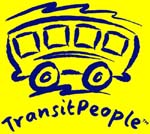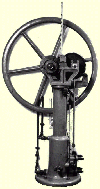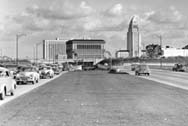
|
In 1878, a German engineer named Nikolaus Otto built a new kind of engine. The internal combustion engine didn't need a separate, heavy boiler to burn fuel, as the steam engine did. It burned the fuel inside the engine itself.
Engineers could build internal combustion engines that were much lighter and smaller than steam engines. And inventors could fit the new engines to smaller vehicles ... like cars. In 1887, the inventor Karl Benz showed a vehicle using the new engine in Germany. The "Motorwagen" could go eight miles an hour and seat two people. This was probably the first car.
Benz built a factory to make cars that people could buy. So did other inventors. The early cars were expensive and very unreliable. Later on, some companies used the internal combustion engine to make a vehicle for carrying lots of people: the bus. Others used it in planes. In 1903, two bicycle shop owners named Wilbur and Orville Wright flew a plane they built on some sandhills in North Carolina. This was the first time a person flew a powered plane anywhere!
In 1908, an American inventor, Henry Ford, created a car he called the Model T. The Model T was more reliable and easier to drive than earlier cars. It was also a lot cheaper. Suddenly, people who weren't rich could buy a car of their own. Henry Ford's factory built up to a thousand Model Ts a day. Cars became much more popular.
People went crazy over cars! People went places in cars instead of using trolley buses. Cadillac, Packard and other companies made expensive cars just for rich people, with leather upholstery and powerful engines. People bought magazines just to look at pictures of cars, and raced cars on race tracks and on the street. Some people wouldn't be friendly with other people unless they liked the cars that they drove!
By the late 1930s, the government had started building special roads just for cars: motorways! Soon cities like Los Angeles had miles and miles of motorways. Cars could go faster than ever! The popularity of cars changed the way new cities and towns were built. Planners didn't have to worry if homes were close to a bus or train stop. Most people didn't care anymore. The planners could make the new communities all spread out, with wide streets and few pavements. People wouldn't walk to the shops or to work: they'd drive!
Meanwhile, the big public transit systems were having big problems. In the 1940s, almost twenty four billion people a year took rides on trains and buses. By the middle 1960s, the number had dropped to seven billion. People didn't want to ride trains or buses when they could afford a car. Public transit systems started losing more and more money. In Los Angeles, the Pacific Electric railway shut down. Other transit operators cut services. Buses and trains weren't popular anymore. People liked cars better. But then cars started causing big problems. |






